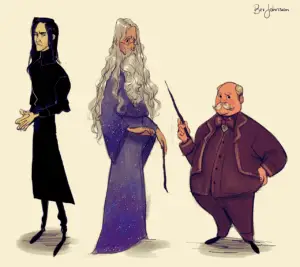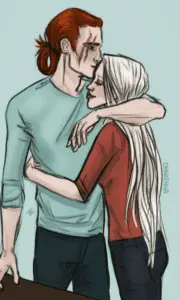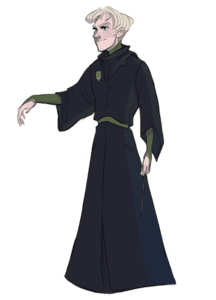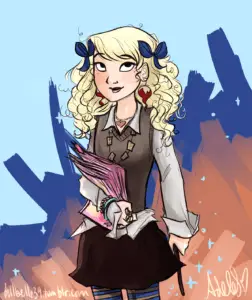Presented by “Harry Potter and the Reread Project”
The end of Order of the Phoenix raised some interesting questions, as I discussed in my last Reread post, for example about the morality of Dumbledore’s actions. It also essentially kickstarted the second Wizarding War by forcing the Ministry into facing that Voldemort was back. Obviously the latter theme carries over into Half Blood Prince, but interestingly enough, the former does right from the beginning, too.
On and On Goes the Manipulation
One of the things that comes up again and again when people discuss Dumbledore is the fact that he left Harry in an abusive household for eleven years and then continuously forced him to go back there. It takes until the end of Order of the Phoenix for JKR to reveal why: Dumbledore used ancient blood magic to extend the protection Lily’s sacrifice gave Harry onto the Dursley’s home, meaning that Voldemort couldn’t touch Harry there.
I personally find it an understandable precaution, despite its existing holes – can Death Eaters still attack Harry there? And what about at school, for example? – but the issue of the Dursleys abusing Harry still stands. At the beginning of Half Blood Prince, Dumbledore visits Privet Drive and lets the Dursleys know that he is deeply angry about the way they have treated their nephew. This, of course, raises a crucial question: Why exactly didn’t he do this way earlier? It’s a question the book never answers, though quite a few good headcanons exist.
What becomes blatantly obvious about Dumbledore is that he, too, is deeply manipulative. He takes Harry with him to persuade Horace Slughorn to end his retirement to return to teach at Hogwarts. Harry’s role is twofold: For one, he is meant to actively persuade Slughorn. But his mere presence and his fame is also meant to entice Slughorn. Slughorn has a habit of “collecting” famous and influential students and Harry is the ultimate prize, so Dumbledore essentially uses him as bait. That is, in and of itself sketchy, behaviour.

It gets even sketchier because Dumbledore never bothers to ask Harry if it’s okay with him to be used in this way. He informs Harry that he needs his help taking care of something but doesn’t specify what this something is until he and Harry are already on his way to Slughorn. Even then he doesn’t tell Harry of Slughorn’s weak spot and that Harry’s pure presence and the promise of access to him would probably be enough to persuade Slughorn to return to Hogwarts until after they’ve already talked to him.He also doesn’t tell Harry that Slughorn’s not meant to teach DADA, like Harry assumes, but to take Snape’s job as the Potions teacher. From Dumbledore’s position, that makes sense: if he tells Harry exactly what he needs him to do and why, Harry might refuse. But that does not make it okay.
It makes the warning Dumbledore gives Harry about Slughorn fairly ironic. After Slughorn has made it clear that he’s willing to return to Hogwarts, Dumbledore tells Harry about his new professor’s habit of surrounding himself with people that would benefit him in some way. He does so to make sure that Harry won’t blindly be used by Slughorn – minutes after Dumbledore himself essentially used Harry for his own purposes.
We at The Fandomentals talked about Dumbledore specifically in the past, but we also talk a lot about depiction versus endorsement. Essentially, depicting certain behaviour in works of fiction does not mean endorsing or normalising it. Context matters. But with Dumbledore specifically, it seems a lot like behaviour that is condemned with other characters is endorsed. He is far from the only example of this, but to me, he seems like the most glaring one – as if JKR had an especially big blind spot when it comes to him.
Internalised Misogyny Galore
Another pretty big blind spot for JKR is her own misogyny. I’ve complained about this before, but considering that it makes a strong return at the beginning of Half Blood Prince, I need to complain about it again. So bear with me.
JKR creates a range of amazing female characters. The most obvious example of this is Hermione, an icon in her own right despite her many problems. But there are also Molly and Ginny Weasley, Tonks, Luna, and probably even Narcissa Malfoy. JKR shows that women can be clever, sarcastic, highly competent, caring, egotistical, funny, and angry. She allows her female characters the full range of human emotions, characteristics and complexity – and yes, considering that the first Harry Potter book came out in 1995 and the lack of good female representation in Young Adult literature during the 90s and the present, this is remarkable.
But the problem is that JKR doesn’t do this well with all of her female characters. When it comes to women that are pretty and/or traditionally feminine, she reverts back to one of the more annoying misoynistic tropes: these kind of women are superficial, self-obsessed, shallow, and often fundamentally inept if they aren’t outright evil. Parvati Patil and Lavender Brown are a fairly obvious examples of the un-evil kind, Pansy Parkinson and Narcissa Malfoy fall squarely into the second category. And then there’s of course Fleur Delacour, maybe the most glaring example of JKR’s misogynistic attitude.
Fleur, as many might remember, is introduced in Goblet of Fire as Beauxbatons’ champion for the Triwizard Tournament. One might conclude from this that she’s smart and talented, but JKR does very little to show her this way – instead, Fleur is incapacitated by Grindylows, underwater creatures that the Trio learns to deal with in their third year, and generally performs worse than the male champions. When Fleur reappears in Half Blood Prince, she’s engaged to Bill Weasley who she met while

working part time at Gringotts to improve her English, though she seems to have essentially dropped her job to prepare the wedding – the only thing she cares about apart from admiring her own reflection in a silver spoon. Yes, that is seriously something JKR makes her do.
Then there’s also the fact that Molly, Ginny, and Hermione absolutely hate Fleur because she’s full of herself. Considering that all three of these are meant to be figures sympathetic to the reader, it’s clear which side we’re meant to take. But the conflict between them also fulfills another typically misogynistic trope, namely the Women Are Catty one.
It also shows another one of JKR’s issues: She can’t really write good relationships between women. Hermione mostly seems annoyed by the other girls in her year because they aren’t as smart as she is and her friendship with Ginny mostly happens off-page, as does Ginny’s friendship with Luna. Ginny and Molly have a mother-daughter relationship that seems to mostly consist of Molly being overbearing and Ginny being annoyed with that. The little we see of Narcissa and Bellatrix’ relationship is fraught because of their differing loyalties. And, as mentioned already, Fleur and her female in-laws mostly hate each other.
However, many science fiction/fantasy franchises lack good relationships or friendships between women. The Hunger Games franchise and Supergirl are the most popular exceptions I can think of, but Star Wars, Doctor Who, A Song of Ice and Fire, the Divergent series and the entire MCU are all noticeably devoid of women and girls supporting, upholding, or relating to each other. That doesn’t mean that Harry Potter’s lack of good relationships between women isn’t annoying, it just means that it’s not an ineptitude that’s limited to one specific author.
A World at War
Of course not everything about the first seven chapters of Half Blood Prince bothered me. I genuinely enjoyed the first two chapters that showed us the Muggle Prime Minister being informed about the most recent developments in the Wizarding World

and Narcissa and Bellatrix’ visiting Snape. Both chapters made it really clear that the stakes had been raised again and especially the second chapter – “Spinner’s End” – laid great ground work for one of the most central story lines of the book by making it clear that Draco is definitely up to something.
I also really enjoy JKR’s portrayal of what is ultimately a society at war with a domestic terrorist organisation. Although I’ve luckily never lived in such a situation, I can imagine that it’s quite realistic. I also love the attention to detail that JKR has paid by incorporating things like the unexplained disappearances of people who don’t seem involved in the conflict at all – like Florean Fortescue – and the fact that people are trying to make a profit off of the existing fear by selling fake amulets and protective charms.
A scene that I liked as well – though her behaviour annoyed me personally – was the way Madame Malkin acted. She was very clearly trying not to take sides by continuing to serve associates of known Death Eaters like the Malfoys because she was afraid of getting onto their bad side but it backfired when Harry, Ron and Hermione entered her store. That scene made it very clear that there was no way to remain neutral in this situation and that trying to do that would inevitably backfire in some way. It’s another realistic portrayal of how many ordinary people would probably act in a situation like this – try to just keep their heads down, go about their lives and not upset anyone that could harm them– on the one hand, but it’s also genuinely true that it won’t work.
Even the Good Wizards Don’t Actually Care
I really love “The Other Minister”, the first chapter of Half Blood Prince in which Scrimgeour is introduced to both the readers and the Muggle Prime Minister of Great Britain who’s the focal point of the scene. On the one hand, the chapter is just genuinely funny in many places – the exasperation and annoyance of the Prime Minister about having to deal with a world he doesn’t understand makes for some great comedic moments.
On the other hand, the chapter offers the rather unique perspective of a semi-informed outsider on the Wizarding World. It also puts a renewed spotlight on the relationship between Muggles and more or less ordinary wizards and again shows that a certain disregard for the well-being and safety of Muggles is par for the course even among wizards who are not at all allied with Voldemort. I’ve written about how little wizards care about how their existence affects Muggles before when talking about Goblet of Fire and the Quidditch World Cup: while people were outraged by the Roberts family being tortured by Death Eaters, not a single character cared how continuous memory charms would affect them. In Half Blood Prince, it becomes very clear that the Ministry of Magic barely cares about the Muggles when it takes them two weeks and multiple catastrophes to inform the Muggle Prime Minister that a domestic terrorist who intends to kill Muggles has returned.
Of course the Ministry and Fudge himself have a lot to deal with, but there is no good reason to wait to inform Muggle authorities that the lives of Muggles are in danger. It’s actually actively irresponsible to not inform the rest of the population of a country that you live in that there is a war going on in your society that will affect them – especially when the other side in said war has actively made threats to that effect.
And then there’s the utter and complete condescension with which both Fudge and Scrimgeour treat the Muggle Prime Minister. They clearly aren’t on equal footing, considering that the Prime Minister lacks both magical abilities and knowledge of the situation, but he is still a competent adult, not a clueless child. At the same time, Fudge especially treats him as if he should know things he has no way of knowing, and then judges him for not knowing them. It’s genuinely infuriating to read.
What I also noticed about both “The Other Minister” and “Spinner’s End” is that they’re quite unlike the first chapters of Philosopher’s Stone and Goblet of Fire. In both of those books, the first chapter is not from Harry’s PoV as well, but unlike in Half Blood Prince, they tie back directly to him. The very first chapter of the book series ends with Harry asleep in front of the Dursley’s doorstep while the first chapter of Goblet of Fire is something Harry dreams of. But neither “The Other Minister” nor “Spinner’s End” are connected to Harry at all.
Chances for Development
What’s going on with Draco is probably the most important story line in Half Blood Prince and possibly the single most important question on Harry’s mind. It’s quite interesting how sudden this seems – Harry has never before paid quite this much attention to Draco Malfoy. One could argue that it’s his way of distracting himself from Sirius’ death and the contents of the prophecy, but there’s little in the actual text showing this.
At the same time, Draco’s barely been more than a tertiary character so far. He’s been a very stereotypically antagonistic bully so far, almost a stock character. Half Blood Prince makes him so central to the story that he also finally gains some space to actually become a character.
Another character who’s clearly developed is Harry himself. It’s interesting to compare the fallout from Sirius’ death to that of Cedric’s death at the beginning of Order of the Phoenix. I’ve made the case that Harry suffers from PTSD and depression after Cedric’s death – he’s listless and demotivated but also willing to take stupid risks, for example when he provokes Dudley. And while Harry had spent most of his time at the Dursleys lying on his bed and barely eating, he is not nearly as angry or as sad at the beginning of Half Blood Prince as he was a year ago. He’s obviously upset about his godfather dying, but he’s coping far better with it than he did with Cedric’s death. Of course we’ve also essentially seen him come to terms with Sirius’ death at the end of the fifth book.

One can also see that Harry developed when you compare how he feels about spending time with Neville and Luna on the train to Hogwarts in Half Blood Prince to Order of the Phoenix, as Mytly pointed out. While he’s originally embarrassed by their company and occasionally annoyed and weirded out by Luna specifically, he feels a lot more comfortable around and being seen with them at the beginning of his sixth year. He generally cares a lot less about what people think about him and seems to have gotten more comfortable in his own skin.
Speaking of Luna Lovegood, I have to admit that her character just doesn’t do anything for me anymore. I don’t know why – as far as I can remember, I’ve never been a big fan of Luna but I’ve never been bothered by her or anything. However, during this reread, she’s just left me utterly cold. I just genuinely don’t care about her. There’s nothing specifically bad or annoying about her and I do get why many Harry Potter fans like and relate to her, but much like Arya from A Song of Ice and Fire or Winn from Supergirl, Luna just doesn’t resonate with me personally. I don’t mind that, though – obviously not every character will be relatable or important to everyone, it’s just how fiction works.
Next time: Harry returns to Hogwarts.

